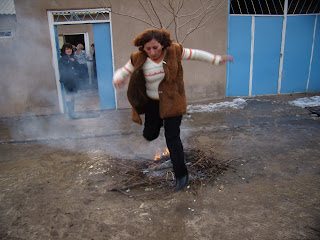The Armenia PC Public Relations committee has embraced International Peace Corps week as an opportunity to educate the American embassy and the Armenian public about our organization’s work in this country. Volunteers were given speaking points in Armenian and English and encouraged to organize community meetings to raise awareness.
As one of the volunteers expecting others to participate in this week’s festivities, I felt an obligation to organize my own ‘meeting’. I called together the leaders from my region’s Youth & Community Action Club to present background information on the PC, a personal testimony about my work at site and provide an open forum for questions and answers to my counterparts and the school director.
The Peace Corps is a source of great pride for my director and this village. As one of the first villages in the region to host a PCV in 2004, my director has always been admired among educational leaders for her proactive attitude and successful project writing skills. After the success of my small meeting on Tuesday, she took the initiative to attend the regional director’s board meeting on Thursday with the same speaking points, PC site application forms and a personal request to the Director of Education & Sport for an announcement to be made about applying for a PCV. She’s the best spokeswoman the organization could hope for.
While individual PCVs promoted the Peace Corps in the regions, in Yerevan opportunities were organized with the US Embassy to provide informal presentations, lunches and language lessons to staff. We were invited to sit in the cafeteria on Thursday and offer up conversation about our experiences in Armenia to both Americans and Armenians on break.
The hope is that more people will have a positive idea of the organization and apply for a volunteer to work in their office or school. Fifty new volunteers will arrive in June and the more sites willing to host them the better.
Introducing Emelyn Ruth Bornstein
10 years ago


 Three times over...
Three times over...

